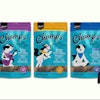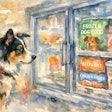1. What new brands, products or packaging have you introduced in the past 12 months (or how many)? Can you provide information on how they are doing in the market to date?
We're starting to branch out into offering more Raw Meaty Bones and recently changed our packaging on these to something more user friendly and less breakage-prone. We currently have Ostrich Necks, Duck Necks/Feet, Chicken Necks/Feet and Rabbit Legs. Last summer we introduced a new treat made from dehydrated Alligator meat that's been very popular so far. This year we will be adding some new frozen food recipes: Ostrich and maybe Bison or possibly Duck. We like to offer products that are not readily available elsewhere. We're also phasing in new frozen food packaging, changing to something more "green" and eco-friendly.
2. What are your company's keys to growth?
It may sound oversimplified, but we listen to our customers. We're large enough to compete but still small enough to care. One way we show our customers that we really do care is to ask for their feedback, and take it to heart. We're also extremely attentive to everything in the Customer Service realm: live people answer our phones, and we respond to every email personally.
We ask people what they want, and do our best to give it to them. This is how we got pushed in the direction of going organic with our ingredients. Using organic ingredients increases costs significantly, but our customers understand that and they are willing to pay more to get what they want. Of course accommodating every request isn't always possible; for example, I can't change our existing recipes because a customer's dog is allergic to one of the ingredients. But what I might do instead is create the next new recipe not to contain that same ingredient.
We stay in touch with changing trends and adapt our products accordingly. Ten years ago the whole concept of raw food for pets was brand new and consumers needed a lot of education and reassurance. Over the years the raw food consumer has gained experience and knowledge and there's a whole new level of sophistication to the education component of our work.
3. What would you say sets your company apart from the competition? (R&D, product development, product promotion, etc.)? What do you strive to be known for?
Several other companies started because a well-meaning owner had a sick pet, discovered the healing power of raw foods, and then started making it at home for their friends. Or they started as a profitable outlet for the "leftovers" from a meat packing company for human consumption meats. In some cases they may have consulted a veterinarian for assistance in formulating their recipes, but most of these foods are not based on a set recipe, nor are they complete and balanced for the nutritional needs of pets. What makes us different is our educational background; I have both a Bachelor's and a Masters degree in Animal Science/Nutrition, while most members of my staff have similar degrees and training. Our recipes are all based on whole-food ingredients. What I mean by that is that we use absolutely nothing synthetic: no vitamin/mineral pre-mix powders; no preservatives or flavorings, etc. We approach the manufacture of pet food from the standpoint of the nutritional best interest of the pets we make it for rather than from a marketing or business standpoint. We believe strongly that raw food is the best way to feed companion dogs, cats and ferrets; we don't just say that while also manufacturing other types of food (kibble and cans). Because of our academic, scientific background, we are able to formulate our own complete and balanced recipes as well as answer any questions customers may have about the recipes, ingredients, or which is the best selection for their own pet.
Another area where we have a distinct advantage over our competition is our factory. We own and operate our own manufacturing facility, rather than "co-packing" or contracting out the production to someone else. We're regularly inspected by the FDA as well as our state's agricultural department. While this has always been a point of pride with us, it has become even more important in the wake of the pet food recalls of a year ago. We maintain complete control over each step in the production process. We have established one-on-one relationships with our vendors such that we know exactly where our ingredients originate, and we are able to inspect -and reject, if necessary-ingredients on arrival. Our customers know they can trust us to have their pets' best interests at heart. I never forget that my name is quite literally on every container that leaves our building. That's a very strong motivation to accept no compromise on safety and quality.
We strive to be known for both possessing and sharing knowledge to promote health and longevity for pets. We will help you even if doing so does not result in a sale for us, because for us the motivating factor is helping others. Any monetary profit is secondary. Jane Williams, our sales rep, adds: We offer exceptional customer service and support, with no 'middle man;' when customers want info they call and get a live, knowledgeable human being willing to spend time talking with them.
4. Please provide sales estimates for the past year or current year to date-or a comment on sales trends.
Despite the roller coaster ride our economy has been on for
the last year or so, it seems as if pet owners are not skimping
on good food, healthful treats, and supplements that
work. We continue to take on new customers daily, and
have not lost any of our long term regulars. As people
become more health conscious and aware for the human members of
their families, they naturally extend these concerns to the
family pets. Our niche market believes in spending the
money up front on good food as a preventive measure rather than
on expensive medical care later on. There is also a
noticeable increase in interest from retail establishments
wanting to carry our products. I believe this is in
direct response to customer demand, as well as evolving
attitudes regarding feeding the type of food we make; people
want to be able to purchase raw food locally to save on
shipping charges. Pet owners are continually more
intrigued by raw food, and stores are finally realizing there
is a market for raw food and are responding by clearing floor
space for freezers.
5. What is the outlook overall for the future of your
company? Any projections or possible new directions?
No big plans at this time, although we may seek greater distribution as pet food distributors become more adept at distributing frozen foods properly. In honor of our tenth anniversary this year, we will be changing our frozen food packaging, in order to go in a more "green" and eco-friendly direction. We are also in the process of redesigning our website to be more user-friendly.
6. Where do you see your biggest opportunities?
Raw, frozen pet food is not for every pet owner. For some there will always be the issue of cost. For others though, it is a matter of fearing the unknown. For us, every day is a new opportunity to help lessen that fear by opening the door to understanding the merits of a different way of feeding our pets. To that end, I have recently begun to make more personal appearances and teach workshops locally. Some of the staff also double as a sales team to visit local retail stores and help educate customers about our products.
7. How would you evaluate the current state of the petfood industry?
Our sales rep, Jane Williams, says: The industry is a mish-mash of ideas promulgated by everyone from corporate executives to veterinarians on what constitutes "good" nutrition. The executives have no training or knowledge of animal nutrition and just want to sell a product regardless of its quality. The training given to veterinarians does not come from people who are nutritionists but from the corporate giants in the petfood industry pushing their own products.
8. What predictions do you have for the petfood industry?
My colleague, Beth Thibodeau, has a prediction to make: The petfood industry will have an increasing number of sales in the all-natural and raw foods area. People will still buy the kibbled/canned mass produced products, but the more enlightened customers will search for quality ingredients sourced and manufactured in the US.
9. What are some of the recent noteworthy
accomplishments of your petfood company?
We are very excited to be celebrating our tenth anniversary this Spring! Having seen other raw food companies come and go during that time, I'm especially proud we are still standing and continuing to build on our strong reputation.
10. How has your company changed over the past several years?
We continue to grow and expand, adding new products and finding new ways to manufacture them efficiently. Our treat division has experienced the most growth in the last couple of years, with the addition of a state-of-the-art custom made dehydrator that has allowed us to dry a wide range of fruits and meats as healthy, low-fat snacks.
How have we not changed? There are some things we just don't do, like a lot of aggressive marketing. By quietly doing what we do best we have steadily built a loyal following. Keeping our growth slow and controlled has contributed to our success and longevity. Another thing that hasn't really changed much at all is the Aunt Jeni staff. The first employees who started with me over nine years ago are still here with me today, and the other half of our staff has been here almost as long. We are a tightknit group who work well together!
11. What are some of your most difficult challenges? In other words, what keeps you awake at night?
There are constant challenges in operating any business, some of which are universal across industry borders. I'll give you the ones that are unique to manufacturing raw pet food. In starting this company, my biggest challenge was figuring out what type of equipment was right for the job. Our frozen food is not like any traditional "pet food;" there is no cooking, extruding, or pelleting. We need to grind meat and bones, puree vegetables and fruits, and pack special containers. There's no resource available for a would-be raw pet food producer to turn to for answers. Everything I've learned about being a manufacturer has been learned the hard way!
The next biggest challenge has been and continues to be marketing a pet food that must be kept frozen at all times. Finding reliable, affordable transportation is an ongoing issue, and maintaining freezers is an extra expense that many stores were not willing to take on. Luckily that viewpoint is changing now, but we still have a ways to go before frozen raw foods become mainstream.
The third challenge involves setting prices successfully. Making frozen pet food is definitely a labor of love, not a get rich quick scheme! The premium ingredients we use carry a big price tag. Plus by the time the product has gone through the layers of distribution, each with its own additional markup, the end user is paying a pretty penny for pet food. This may sound strange, but I really stress over raising our prices. Throughout all of last year when our costs on everything were skyrocketing, I refused to raise prices to our customers. I worried a lot, but we've only ever had one price increase per year and I think our customers appreciate that they can count on our prices staying the same all year. It's one less thing to worry about in an economy gone wild; at least the family pet can still eat well.
12. How have the petfood recalls changed your relationships with your suppliers?
Not as much as you might think. We've always insisted on purchasing human-grade ingredients, despite the skepticism and scorn this prompted from some vendors. Some have tried, over the years, to sell us unacceptable items because they think it's just for pet food, so it won't matter. We have never hesitated to reject a delivery when necessary, or to move on to a new vendor. By now our suppliers know that we simply will not accept substandard quality.
Beth Thibodeau adds: We research all of our suppliers to determine the origin and growing conditions of all our ingredients. We know that our customers will demand straight answers to these questions, and we need to be equipped to provide those.
13. How has the petfood recall crisis changed your
attitudes about using copackers?
If anything it has only reinforced the wisdom of the decision I made years ago not to take that route. We've boasted for years about doing everything ourselves, but only since the last recall crisis has it become particularly meaningful to our customers. During the crisis, we received a lot of calls and emails from our regular customers, expressing gratitude that they did not have to worry because they knew their pet's food was safe. It's so gratifying to know we have made someone's life a little easier.
Beth Thibodeau points out: We like to have complete control over all aspects of our products, from the selection of ingredients to the final product. There is less chance of alien ingredients or tampering when everything is done in-house. We even do our own microbial testing in-house; that way we have instant access to the information in the unlikely event we would ever need to destroy a batch, although that has never happened!
14. Is there anything else you'd like to tell our readers about your company?
I noticed none of these questions establishes anything about Aunt Jeni's Home Made , so here is a little bit of background on how we started and what we are all about.
After obtaining my Bachelors degree in Animal Science ( University of Maryland , 1985), I held a series of positions within the USDA. Dissatisfied with lab work that often involved sacrificing the animals I cared for, I eventually returned to school, to pursue a career as a CPA. Then the day came that one of my dogs was seriously ill, necessitating a visit to a teaching vet hospital. This event reminded me that my true calling lay in working with animals, not numbers. Soon after that, I enrolled in graduate school where I studied an endangered South American species called the Maned Wolf. My research was conducted through the National Zoo in Washington, D.C. and resulted in the development of a special diet to address a genetic health condition that affects not only these wild animals but also some domestic dogs. The diet was later manufactured by Purina Mills under the Mazuri name, and made available to all institutions keeping Maned Wolves, as well as to pet owners whose dogs suffer from Cystinuria. For this work, ("Dietary Control of Cystinuria in Maned Wolves") I received my Masters degree in Animal Nutrition Science (University of Maryland, 1998).
After graduating with my Masters, I began doing consulting work for pet owners whose dogs or cats were facing health issues. Whenever I could persuade someone to prepare their own homemade pet food, the pet would show remarkable improvement. The challenge lay in convincing busy people to "cook for their dogs." I soon realized there was a need for someone to do the work of preparing the food, and that started me on the road to Manufacturing. With my background training in the academic/scientific community and my gravitation toward the world of holistic care, I found myself in a position to combine the best of both worlds into something special and different. Aunt Jeni's Home Made was created to provide products that answer a real need for people who want the best for their pets.













